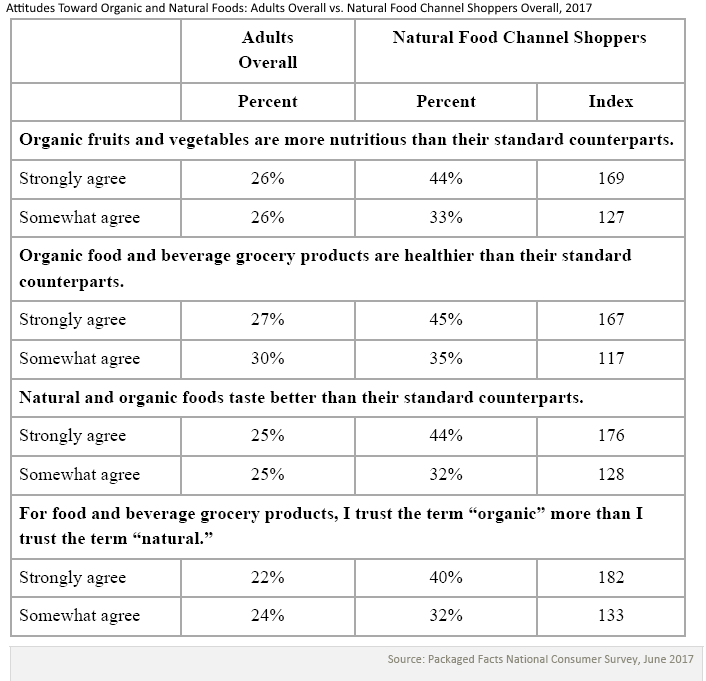Natural Foods Shoppers are Calling Retailer Shots
by Sarah Schmidt
October 13, 2017
Ingredient transparency in the form of "clean labels is of growing interest to consumers. Clean label refers to food products that make specific "free-of" marketing claims -- they don't contain artificial flavors, colors, preservatives, sweeteners, hormones, and antibiotics.
America's perennial enthusiasm for health and wellness is expressed in their food product choices. Natural and organic retailers are often the first to meet this demand:
- 72% of adults overall strongly or somewhat agree that grocery products without artificial ingredients are healthier, and 58% strongly or somewhat agree that they taste better
- 87% of natural & organic food channel shoppers agree that clean label foods are healthier, while 81% say they taste better.
Safe Havens for Non-GMO Shoppers
Organic food products are non-GMO, though not all non-GMO products are organic. Marketers sometime choose to use both seals to characterize their products and gain a marketing advantage.
Among adults overall:
- Over half (58%) are concerned about the safety of genetically modified foods
- Nearly half (46%) actively seek out non-GMO foods
Among natural foods channel shoppers:
- Four-fifths are concerned about GMO foods
- Nearly three-quarters (72%) avoid GMO foods
GMO organisms have spread throughout the food chain since 1996. Although the scientific community and federal agencies (FDA, USDA, EPA) agree that GMO crops pose no threat to human health, a broad and vocal base of advocacy groups holds that GMOs are not safe, or are not environmentally or socio-economically desirable.
Some natural product retailers have created "safe havens" for shoppers seeking to completely avoid GMO foods, following a July 2016 bill that requires most food packages to disclose GMOs.
In early 2017, Earth Fare announced it was removing GMOs from its 500+ private label products, catering to consumers who wish to completely avoid GMO foods.
And in 2013, Whole Foods announced it would require its suppliers to label all products containing genetically modified ingredients by September 2018, when the bill has taken effect. As of Fall 2017, it already had over 30,000 organic and 13,500 non-GMO Project-verified items on shelves.
Consumers Expect- and Receive - More from Organic Retailers
Natural foods retailers have given rise to the consumer expectation that natural and organic foods will always be readily available, as covered in Packaged Facts' new report, Whole Foods, Trader Joe's, and Natural Channel Grocery Shopping, The Future of food Retailing.
Because consumers' influence on retailers is growing in the natural and organic foods segment, brands must innovate new methods of communications and services to connect with and stay relevant to new cohorts of customers. Mainstream and even value supermarkets are emphasizing natural & organic food products:
- Kroger, which is expanding its Simple Truth store-brand lines of natural and organic foods
- Lucky's, which fields "L" store brand boasting more affordable "Organic for the 99%"
- Walmart, which is building out its affordably
For natural grocers like Whole Foods and Trader Joe's, the good news is that they are well ahead of the natural and organic curve. On the other hand, as evidenced by the "Whole Paycheck" moniker Whole Foods ahas been trying to shed, consumers do not want natural and organic foods unconditionally -- they still want foods that are both readily available and affordable.
The concentration on store brands reflects marketers' emphasis on overall value to win over natural/organic consumers. And for pure-play natural and organic chains looking to connect with organic foods consumers, establishing product innovation on top of values such as transparency and healthfulness will keep profits green in an increasingly competitive market.
Have unique research needs?
Freedonia Custom Research listens intently to your needs and objectives. Then we work diligently to define and deliver a service to meet them.Subscribe to Our Blog
Stay up to date with the latest information about new market research and news in areas relevant to your business from our analysts and team members.Packaged Facts Blog Subscription
Provide the following details to subscribe.
